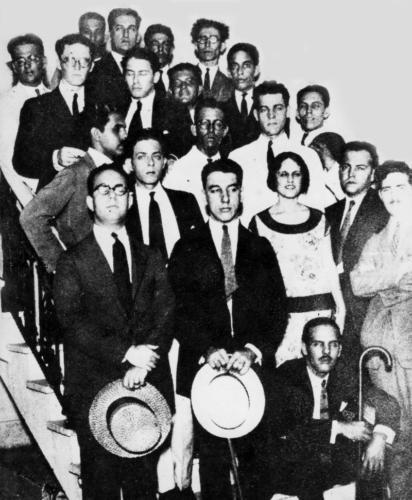
Havana, November 3 - From the First National Congress of Students held in Havana between October 15 and 25, 1923, which itself emerged from a Latin American movement of university reform, an institution was born that sought to unite students and workers in the common purpose of revolutionizing Cuban society: the José Martí Popular University (UPJM, for its acronym in Spanish). Its main inspiration was Julio Antonio Mella, who called it "the beloved daughter of my dreams."
Two agreements stand out in the Declaration of the Rights and Duties of Students, proposed by Mella and approved at the Congress: the duty of students to disseminate their knowledge in society, primarily among manual laborers, and the close link with the Havana Workers' Federation, whose leadership fell to the distinguished typographer worker and personal friend of the José Martí Popular University, Alfredo López.
The imposing staircase that distinguishes the Havana University did not exist then, which is why to attend the classes that began on November 3, 1923, when the José Martí Popular University was inaugurated, hundreds of workers ascended the hill. Since the classrooms were not designed for night teaching and therefore lacked lighting, engineering students took charge of the electrical installation.
The emergence of the UPJM in an exploitative society dominated by Yankee imperialism pursued a much more ambitious goal than just linking students and workers to educate the latter; it sought to prepare the working class to play its role as the transforming vanguard of society to achieve a regime of social justice.
The subjects covered classes for illiterate people and the primary level of education. For secondary education, the topics were Universal Geography, History of Humanity and of Cuba, Psychology and Logic, Grammar and Literature, Civics, Natural History, General Studies (Emergency Medicine and Hygiene), Maternity and Sexual Prophylaxis, Natural Sciences, Political and Social Economy, Law, Labor Legislation, Anti-dogmatic Morality, and Rudiments of the Science of Religions, among others.
Cultural evenings on social and political subjects were also organized, which included artistic performances staged by groups of amateur workers and students, and Sunday conferences on social topics were held at the Wilson cinema, located on Belascoaín and San Rafael streets.
Due to the capitulation of some student leaders and the actions of reactionary forces, the University's Law School ceased to be the headquarters of the UPJM and had to relocate to other venues, such as the headquarters of the Anti-Clerical Federation of Cuba, located at 72 Reina Street, as well as branches in the Luyanó and Príncipe neighborhoods. Branches were opened in San Antonio de los Baños, Santiago de las Vegas, Regla, and Guanabacoa. Classes were also held at the Havana Junior High School, union halls such as the Havana Cigar Rollers' Federation, among others.
The photo accompanying this text, which shows several professors of the UPJM, was taken precisely on the staircase leading to the second floor of the current Palace of the Cigar Rollers, and among the teachers are Mella himself and Rubén Martínez Villena, in addition to outstanding students and intellectuals.
Mella's departure for Mexico did not distance him from the UPJM, whose work he followed from afar. Nevertheless, it was closed by the tyrant Gerardo Machado in 1927. Regarding this event and the significance of this institution, Mella wrote to his comrade-in-arms and friend Sarah Pascual:
"[...] The Popular University is not a secret insurrectionary society. Even the police themselves know this. But the teaching of the José Martí Popular University has insurrected more than one dormant and domesticated conscience, it has insurrected it against political despotism, against economic injustice, against foreign domination, against the 'value' of ignorance. The declaration of illegality is one more accolade for the University. At a time when brute force reigns as a political formula, it is natural that the José Martí Popular University would suffer, like the University and the Institute of Havana, a prudent closure." (Text and photo: Trabajadores Digital)